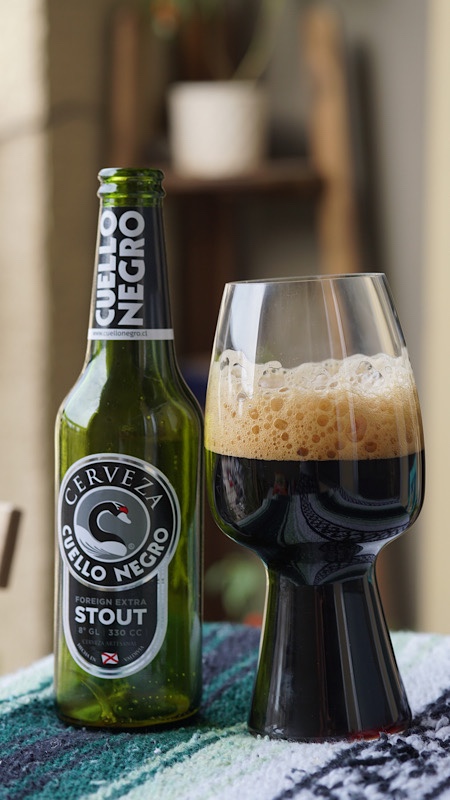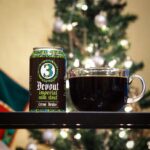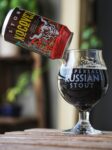This week, we dig into our stash from the November 2020 trip down to the southern half of Chile and crack open this foreign export stout from Cuello Negro. When was the last time you saw a stout in a green glass bottle?
Who is Cuello Negro?
Cuello Negro is a microbrewery that currently produces two beers: a foreign export stout and an Ambar pale ale. While other breweries may make a name for themselves by pumping out as many different types of beers as possible, the folks at Cuello Negro focus on quality over wuantity.
Founded by Cristián Olivares, this Chilean brewery focuses on making artisanal beer in an area that has a surprising tradition of beer making that is slowly gaining visibility outside of their domestic market.
Where is Cuello Negro from?
Cuello Negro’s brewery is nestled in the southern city of Validivia in Chile’s Los Rios region. This is a natural gem of an area that is too often overshadowed by its more recognizable neighbors that serve as popular gateways to Patagonia. Southern Chile has a long history of beer making that takes back to the late 19th century. This area is now home to a budding community of Chilean craft breweries. Cuello Negro prides itself in sourcing its water from nearby natural water sources to give you a true taste of the terroir.

Cuello Negro, which directly translates to “black neck”, is named after the balck-necked swan that is native to the southern tip of South America. These swans are commonly found around Patagonia and are known to migrate as far north as Bolivia & Brazil. If you have ever been in the south of Chile during the austral winter, you understand their desire to flee to warmer climates when the temperature drops!
What’s so special about Cuello Negro’s Foreign Export Stout?
Traditionally, foreign export stouts are a stronger & heartier version of a brewery’s stout recipe. The higher alcohol content helps these stouts survive long overseas trips from the production location to the consumer. Guinness’ Foreign Export Stout is perhaps the most well-known example of this beer style, but I’d put up Cuello Negro’s offering against any other breweries’ export stout.
Cuello Negro has received multiple awards for this stout in beer competitions around the world (including a gold medal at the 2017 Brussels Beer Challenge).
In my humble opinion, Cuello Negro’s stout is easily their best beer. This foreign export stout weighs in at a sneaky 8% ABV (56 IBU) that could easily win favor with consumers outside of Chile. I couldn’t find any sources to confirm that Cuello Negro is exporting this beer beyond its borders, but this stout is worth seeking out.
What does Cuello Negro’s Foreign Export Stout taste like?
Expect a dark chocolate-colored pour with a long-lasting tan foam head when pouring from the bottle.
The aroma is deeply intoxicating with rich chocolate & espresso notes along with hints of dried dates. Don’t expect a thick mouthfeel like a nitro Guinness; this Cuello Negro stout is lighter and more delicate on the palate.
Take a sip and you will immediately get the classic roastiness one would expect from a proper foreign export stout. Bittersweet dark chocolate notes balance out the malty roastiness, and the dry finish helps round out the classic flavor profile.
Final Thoughts
Stouts are fantastic as a standalone beverage, but they are truly elevated when paired with a complimentary dish. For this Chilean foreign export stout, I can’t think of any better pairing than with fresh oysters or cazuela (a home-cooked beef stew common in many Chilean households).
Cuello Negro has something special on their hands with this stout. I hope more beer lovers get a chance to try out their take on an iconic style of beer.
What are your favorite foreign export stouts? Let us know on Instagram by tagging us in a pic!




